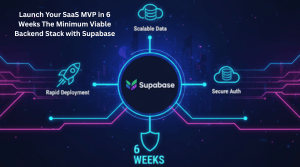In today’s app development landscape, the need for scalable backends has become a priority for developers and businesses alike. Two backend-as-a-service (BaaS) platforms that have garnered significant attention are Firebase and Supabase. Both platforms simplify the backend development process, but their underlying architectures differ significantly, especially when it comes to scalability and data management. In this blog, we’ll explore the key differences between Supabase and Firebase, and why choosing open-source Postgres with Supabase might be the best decision for scaling your app.
Introduction: The Rise of Backend-as-a-Service (BaaS)
Backend-as-a-service platforms have revolutionized the way developers build and deploy applications. BaaS solutions like Firebase and Supabase allow developers to focus on building user-facing features without worrying about infrastructure management. However, as your app grows, your backend needs become more complex, and that’s where the choice of platform becomes critical.
Firebase, developed by Google, was one of the early pioneers in BaaS, providing a NoSQL database, real-time capabilities, and easy integration with other Google Cloud services. But as the demand for scalability and data flexibility grows, some developers are now looking for alternatives that can offer better control and the power of SQL databases. Supabase, an open-source alternative built on top of PostgreSQL, is a growing contender in this space.
This blog explores the differences between Firebase and Supabase, helping you determine when to choose open-source Postgres for your app’s scalability needs.
Firebase in a Nutshell: Google’s Real-Time Powerhouse
Firebase offers a suite of services, including a real-time NoSQL database (Firestore), authentication, hosting, and cloud functions. It’s designed to provide an easy-to-use, out-of-the-box solution for developers to get apps up and running quickly.
Key Features of Firebase:
- Real-time Database (Firestore): Firebase’s real-time database allows you to sync data across all clients instantly. This is perfect for applications like chat apps, gaming leaderboards, or IoT apps that require constant data updates.
- Authentication & Hosting: Firebase offers simple authentication with multiple sign-in providers (Google, Facebook, Twitter) and provides an easy-to-use hosting platform.
- Serverless Functions: Firebase offers cloud functions to write backend logic without managing servers.
However, as your app grows, Firebase starts to show limitations. While it excels in real-time applications and rapid prototyping, Firebase’s NoSQL database can struggle with complex queries and relational data management. The pricing model, which charges based on reads, writes, and storage, can become expensive as your app scales.
Supabase 101: The Open-Source Firebase Alternative
Supabase is an open-source backend-as-a-service platform that uses PostgreSQL as its core database engine. Built on top of Postgres, it offers many of the same features as Firebase—like authentication, storage, and real-time subscriptions—while providing the power of a relational database.
Key Features of Supabase:
- Relational Database (PostgreSQL): Supabase uses Postgres, a mature and feature-rich relational database management system (RDBMS) that supports SQL queries, complex joins, and transactions.
- Real-time Subscriptions: Just like Firebase, Supabase offers real-time data synchronization, making it suitable for real-time applications like messaging apps or collaborative platforms.
- Authentication & Storage: Supabase provides authentication and file storage out-of-the-box, just like Firebase, with the added benefit of being open-source.
One of the major advantages of Supabase development services is its ability to leverage the full power of PostgreSQL, which offers advanced features such as full-text search, geospatial queries, and data integrity, all while being open-source. Supabase’s relational model offers more flexibility and control over your data as compared to Firebase’s NoSQL model.
Head-to-Head Comparison: Supabase vs Firebase
Let’s dive deeper into how Supabase and Firebase compare on several crucial factors:
Architecture: NoSQL vs. SQL
- Firebase uses Firestore, a NoSQL database that stores data as JSON documents. This is ideal for simple, hierarchical data models, but it can become inefficient when dealing with complex data or relational structures.
- Supabase uses PostgreSQL, an open-source relational database that excels at handling complex queries, joins, and transactions. Postgres provides a flexible schema and supports advanced data types like arrays, JSONB, and custom data types.
Performance & Scalability
- Firebase is optimized for real-time applications and excels when you have simple, flat data structures. However, as the app scales and the amount of data grows, Firebase may experience performance issues with complex queries or large-scale data operations.
- Supabase benefits from PostgreSQL’s robust indexing and query optimization capabilities. It’s better suited for applications that need to handle complex relationships and large amounts of data without compromising performance.Pricing
- Firebase offers a free tier, but scaling comes at a cost. Firebase charges for data reads, writes, and storage, which can become expensive for large-scale applications. For example, as the number of reads and writes increases, your costs could skyrocket.
- Supabase, on the other hand, has a transparent and predictable pricing model. It charges based on the amount of storage, requests, and API usage, but the cost structure tends to be more predictable for larger apps. Additionally, since Supabase is open-source, you have the option to self-host, which could reduce costs in the long run.
Ready to Choose Your Backend?
Stop guessing which platform will scale with you. Download our detailed feature breakdown checklist to see a side-by-side comparison of Supabase’s open-source power versus Firebase’s established ecosystem.
When Supabase Wins: Use Cases & Scenarios
Supabase is a great choice for applications that need to scale and handle complex data structures. Here are some use cases where Supabase shines:
- Apps with relational data: If your app requires complex queries, joins, or relationships between different data entities (e.g., a SaaS platform, social media platform, or marketplace), Supabase’s SQL database is better suited for the job.
- Startups planning long-term scalability: Supabase’s ability to scale with predictable pricing makes it a great choice for startups that want to avoid vendor lock-in and keep costs manageable as their app grows.
- Open-source-first companies: If your company prioritizes open-source technologies or needs complete control over your infrastructure, Supabase is a clear winner.
When Firebase Still Makes Sense
While Supabase offers excellent scalability for larger applications, Firebase still has its place in the developer ecosystem. Here are some scenarios where Firebase is a better fit:
- Rapid prototyping or MVPs: Firebase’s ease of use and real-time capabilities make it perfect for quickly building and deploying MVPs or applications that require minimal setup.
- Real-time applications: Firebase’s real-time database is optimized for applications like messaging apps, IoT, and real-time gaming, where real-time data synchronization is a priority.
- Mobile-first apps: Firebase integrates seamlessly with mobile platforms (especially Android), making it a great choice for mobile-first applications.
Supabase for Scalability: Why Postgres Changes the Game
PostgreSQL is one of the most robust and mature relational databases available, and it provides several advantages over Firebase’s NoSQL solution when it comes to scalability:
- ACID Compliance: PostgreSQL supports ACID transactions, which ensures data integrity even in the case of failures.
- Advanced Queries: With PostgreSQL, you can perform complex queries and joins with ease. It also supports full-text search, geospatial queries, and other advanced functionalities that Firebase’s NoSQL database cannot handle.
- Scalable Storage: PostgreSQL can handle large datasets and scale efficiently, which is essential as your app grows.
With Supabase, you can take full advantage of PostgreSQL’s scalability without dealing with the limitations of Firebase’s NoSQL database.
Migration Insights: Moving from Firebase to Supabase
If you’ve already built your app using Firebase but are considering a move to Supabase, the process isn’t as difficult as it might sound. Here’s a basic outline of the steps involved:
- Data Modeling: Firebase uses a NoSQL data model, so you’ll need to refactor your data schema to fit PostgreSQL’s relational model.
- Authentication Migration: Supabase provides a similar authentication service to Firebase, so migrating your user data and authentication system is straightforward.
- API Rewrites: Firebase provides a NoSQL query language, while Supabase uses SQL. You’ll need to rewrite your data queries to be compatible with SQL.
There are several tools and resources available to help with the migration process, and Supabase’s documentation provides a comprehensive guide to get you started.
Final Verdict: Which One Should You Choose?
In summary, Firebase is an excellent choice for building real-time apps quickly, especially if you’re working with simple data models. However, if you need more control, scalability, and the flexibility to handle complex data structures, Supabase with its open-source PostgreSQL database is the way to go.
For apps that demand long-term scalability, advanced data operations, and complete data ownership, Supabase offers a robust, cost-effective, and open-source alternative to Firebase.
If you’re scaling beyond an MVP or planning for the future, Supabase’s relational database might just be the backend solution you need to avoid Firebase’s limitations.
Relevant Hashtags:
#SupabaseVsFirebase #FirebaseAlternative #BaaS #BackendAsAService #DevTools #Postgres #PostgreSQL #OpenSource #SQL #NoSQL #Scalability #WebDev #AppDevelopment #FullStack #Serverless #TechComparison #Realtime


